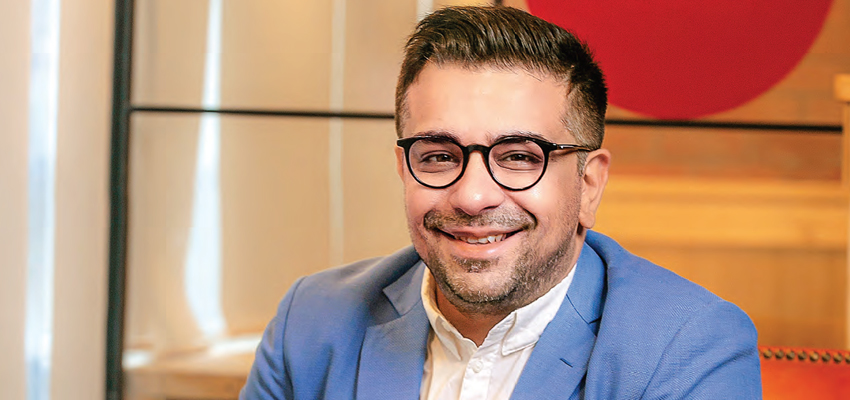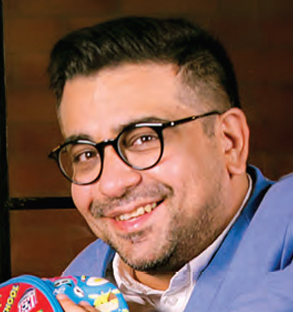Don’t give up on the Game

Success is not a sprint, it is a marathon filled with many obstacles. Perhaps no one embodies this adage more astutely than Sumit Suneja, Managing Partner, Merlin First & Co. Sumit is a serial entrepreneur who has had to conquer multiple setbacks before he achieved success. He strongly believes that failure teaches you more than even the greatest success can. Corporate Citizen chats with Sumit about his entrepreneurial journey, the lessons he learnt along the way, and the fascinating story behind the success of Merlin First & Co.
"Indian parents and their preferences have changed but their choices for products for small kids haven’t. When we were kids we used to play on the floor. Now parents want a high chair for their kids. They want a crib"
- Sumit Suneja
Corporate Citizen: Tell us about your educational journey.
I never got a chance to finish college. I did enrol in Delhi University but I never finished it. I was never very good at my studies. At that time, my father’s business needed my attention because it was going through a troubled time. I studied at a prestigious school but didn’t really end up continuing my further studies.
CC: In 1999, you started working as a senior VP of a DVD company.
Yes, that was my father’s business. Before the DVDs, the most popular format for viewing was VHS. There was a period where VHS became a dead format and cable TV had taken its place. There was a lull in the middle where my father’s business was struggling because there was no one buying video cassettes. We had a large tape library and copyrights which we had amassed which amounted to nothing. This happened to a lot of similar businesses. We had a lucky break when DVDs and VCDs came into play. China was innovative enough to bring down the prices of DVD and VCD players and this encouraged a lot of people to buy them. This led to a demand for VCDs and DVDs and that’s how we bounced back. This is where the first learning of my life came. I learnt that you have to start playing and continue playing and your day will come. If you give up and don’t stick around, you will never succeed. It’s important to sustain.
CC: In 2010, you launched an audiobook company called Reado.
By 2007, when my father’s business was at its peak, I felt I had to do something of my own. I left that business with no stake of my own. I didn’t take even a penny in ownership. As a 30-year-old young man, I felt that I had helped establish my father’s business and I will make mine too. But of course, that was easier said than done. Whatever wisdom I had earned and all the savings that I had I put into making audiobooks. This venture was completely owned by me and my brother. Some kids are happy working with their parents for a long time. I am one of these people who would rather make something of my own. I also felt that when would I learn on my own if I only worked with my father. Reado was a struggle from day one. The format of audiobooks was not that popular in India. It is now that podcasts are becoming popular. But the problem in India is that we hate paying for content, especially non-tangible content. Even if you see Netflix, you will see that five people share an account.

CC: You started Merlin Brands as a reseller of international brands. How did that come about?
I worked on Reado for 7-8 years and it flopped. When you lose so much money, your credibility comes into question and nobody trusts you in the market. What do you do then? We started a simple trading business, and for a trading business, the only area I felt was the way forward, was the kids, toddlers and parenting space. Whenever I used to travel to the US, people used to ask me to either get back with me iPhones and iPads, or creams and feeding bottles for their kids. I used to be astounded that there were no demands in the middle. No one asks for clothes or any other thing as they are all available in India. It was either a cutting edge tech product (iPhone) or baby products. I was surprised that people asked for feeding bottles as if they weren’t available in India. Then I found out that there are very few brands in India and they hadn’t changed much since we were kids. They hadn’t upgraded their products in-line with the changing tastes of customers. Indian parents and their preferences have changed but their choices for products for small kids haven’t. When we were kids we used to play on the floor. Now parents want a high chair for their kids. They want a crib. They want car seats for children. They also want specific creams, detergents and shampoos for babies. I realised that the one thing the Western world has yet to give to India is the way to raise babies, because people in India are now becoming independent and are also raising babies without their parents and in-laws like they traditionally did for decades.
We knew this was the way forward but we did not want to make any more mistakes in this venture. We did not want to burn our money by taking an unnecessary risk, so we did a market test. We collected goods worth Rs.14-15 lakh, and we got our first foreign brand in India for a feeding bottle. After import duties and other taxes, that feeding bottle was priced at Rs.2000. This was the litmus test for us. We just listed the product on Amazon, FirstCry and other portals and 7-8 stores in Delhi. To our delight, we sold out within two months of hitting the market. We realised that there was value in this, and in due course, we added a few more consignments and then we added more and more brands, and we realised that we had become the pioneer in international brands in the parenting category in India. We were the only company that was bringing international brands at that scale in India. Mothercare, Hamleys, and all the high-end stores in India who wanted to stock parenting products had to work with us because we had a lot of brands under one umbrella.
CC: What was the feedback from parents like?
While we were distributing these international brands, we got a lot of feedback from customers about the quality of the products. Most of them were unhappy with the high price and some with the quality of the products. I was surprised that international products were getting so many complaints. Then one fine day, even my wife complained about a diaper bag, saying that the zipper was too hard. This was a Rs.22 thousand bag, and that’s when I understood. You can’t charge a premium for a product and then not live up to it. That changed everything. We realised that these foreign brands will never change. American and European brands will always be more expensive, and we would still not have control over quality. So, we decided to start our own brand. In May 2019, we formally told all the brands which we distributed that when our commitment to them ended, we will be starting our own brand. We even helped them find new distributors and then we moved on.
"My decision to go out on my own and start Reado was the proudest decision I have taken. I was not a college graduate. Reado turned out to be my own personal MBA"

CC: How did the pandemic affect your growth?
We had planned a whole range of back to school 2020 products. We were very happy with the designs and were ready to launch, but as the world knows, schools never opened due to the Covid-19 pandemic. We were completely distressed. But persistence is the goal. You have to promise to yourself that you won’t lose the game. You must continue playing in hopes that a softball will be bowled. We decided to sell one of our products, a kids stainless steel cup. It was our cheapest product. We started to promote it as a summer drinks product. Within a month, we sold over 12,000 units. At that time, India was in a near-complete lockdown and only e-commerce was functioning. For a disheartened company, this was a huge number. We started marketing the entire series, with the cup as a gateway drug, followed by a schoolbag, a bottle, a lunchbox, etc. This was a huge success. So enthusiastic was the response that we decided to expand outside India as well. Now we are present in four more countries.
CC: How is the expansion working out?
We have got repeat orders from all the countries and we are hoping that as the brand grows there, we will find a good foothold to expand further.
CC: What are some of the initiatives you have taken in your career which you are most proud of?
My decision to go out on my own and start Reado was the proudest decision I have taken. I was not a college graduate. Reado turned out to be my own personal MBA. I learnt more from Reado than I would have in any academic course.
CC: Merlin brands is a family-owned company. India has the third-highest number of family- owned businesses in the world. What are some challenges and advantages of working in a family-owned business?
In my opinion, there is no challenge. There is absolutely none whatsoever. From my family, it is just me and my brother and my wife too works with us. We complement each other. I think that is one of the reasons we have grown so much in such a short time.
CC: How do you manage to achieve a healthy work-life balance?
I don’t think achieving a healthy work-life balance is possible for a startup. If somebody thinks there is then they must be more honest with themselves. After you get to a point on your journey and there is a self-fulfilling engine in place, then sure, there is a beautiful life and balance that you can achieve after that. But in the initial few years I don’t think it is possible. I start my day at 4 AM and finish it by 9 PM. I work 16-17 hours a day. So does my brother as well as my wife. We work 80-100 hours a week.
CC: You are pre-dominantly playing in the urban lifestyle market. Do you see potential in expanding to Tier 2 and Tier 3 cities down the line?
I think we may enter the Tier 2 cities a little down the line. But I don’t think Tier 3 cities will be on the cards as that is not our strength. We like to stick to what we can do better. We would like to take our brand to more countries. Instead of going deeper, we would rather go wider.
"Look for failure. Don’t run away from it. No amount of success can teach you what failure can. Failure will build you. If you are young, you still have the time to fail"

CC: There is tremendous competition abroad. How do you differentiate yourself there?
Internationally, there have been companies who have been doing this for years. How we try to differentiate ourselves is by trying to control the narrative. The narrative can be controlled by having the right marketing in place. All the companies who are amazing in terms of their product line, have a chink in their armour, which is marketing. Simply opening an instagram page is not enough to market your products. For example, we are starting our own podcast for our brands Headway and Rabitat, and this podcast won’t be just another plug for Headway and Rabitat products. We are going to make it a publication channel just for our consumers. We want to give back to our community. We just have to talk to them and create enough content for them and not try to sell them anything. This kind of genuine strategy is missing in the market.
CC: What advice would you give to budding young entrepreneurs who are looking to build their own business during an extremely unprecedented time?
There are so many lessons I have learnt in my life. But a couple of them stand out. The first is that you should look for failure. Don’t run away from it. No amount of success can teach you what failure can. Failure will build you. If you are young, you still have the time to fail. When I was 30, I had the time to fail. Today when I am 40, I don’t have the luxury and time of failing. The other thing I would say is that you must keep playing. Don’t just give up on the game. You may sometimes feel that you have no option but to give up, but you have to keep batting. There will be overs where you will get the opportunity to score big.
CC: What is your idea of relaxation?
I love going for a nice walk. A good walk around nature refreshes me. I don’t watch TV series, I rarely watch movies. I never commit to any recreational activity which requires more than two hours of commitment. Therefore, I never watch TV or web series. I feel any entrepreneur who dreams of building anything should run away from TV series (laughs).